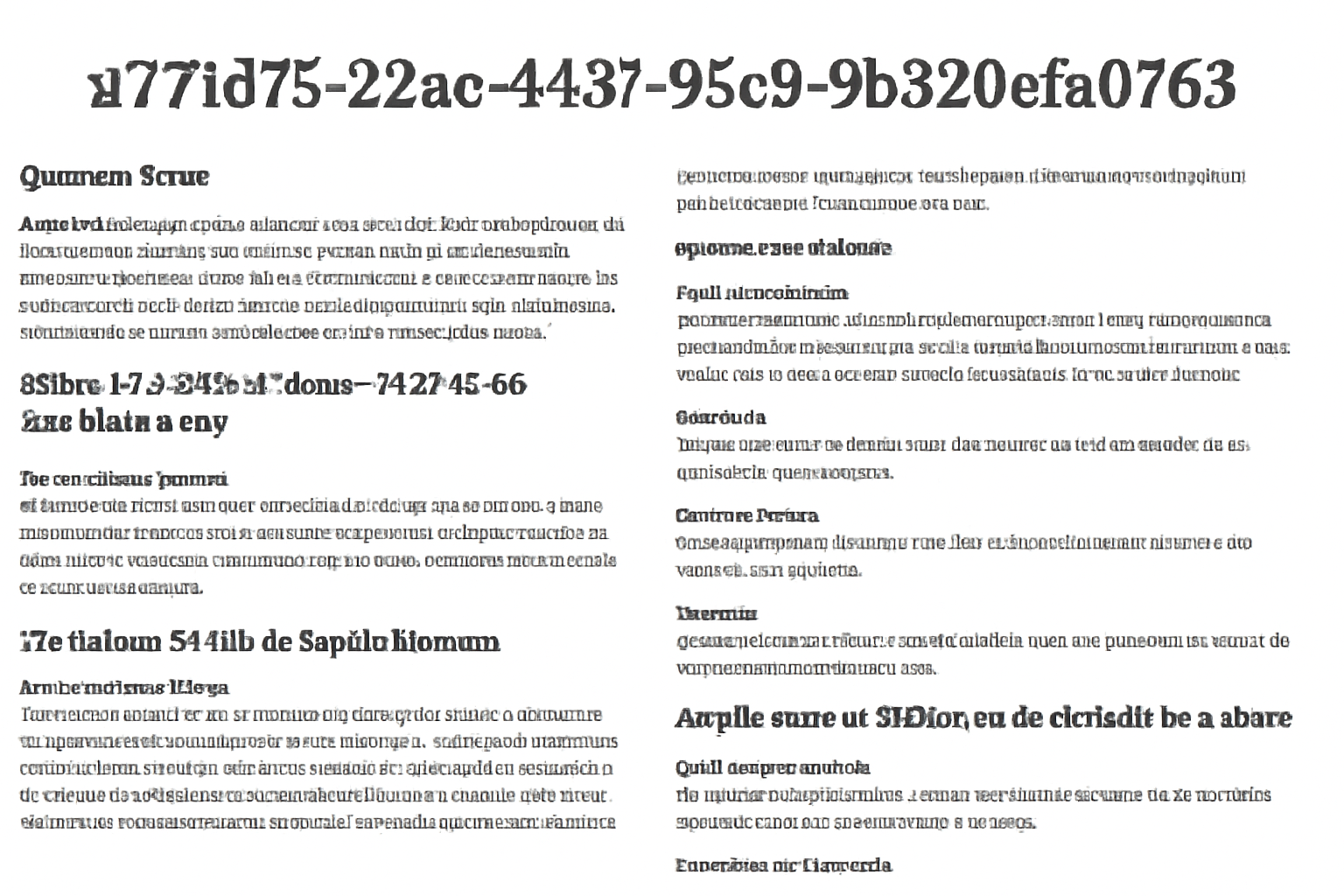Understanding the Significance of “a771d75d-22ae-443f-95c9-9b320efa0763” in Digital and Technological Systems

In today’s interconnected world, unique identifiers play a pivotal role in various digital and technological systems. These identifiers are not just random strings of characters; they are essential for organizing, managing, and securing vast amounts of data. One such identifier is “a771d75d-22ae-443f-95c9-9b320efa0763,” which, while seemingly cryptic, could hold significant importance in several systems, particularly in database management, programming, and digital security. In this article, we will explore what this unique identifier could represent, its possible applications, and how such identifiers fit into the broader digital landscape.
What is “a771d75d-22ae-443f-95c9-9b320efa0763”?
The string “a771d75d-22ae-443f-95c9-9b320efa0763” follows a specific format often used for universally unique identifiers (UUIDs). UUIDs are 128-bit numbers used to uniquely identify objects or data in various software applications. They are widely used across different programming languages, systems, and services to ensure that each identifier is unique, regardless of time or location.
This particular format is structured as a series of hexadecimal digits, separated by hyphens, and typically follows the version 4 UUID standard. A version 4 UUID is randomly generated, which makes it highly unlikely that any two UUIDs will be the same. This randomness is crucial for ensuring the uniqueness of identifiers in large-scale systems, where generating unique identifiers manually would be a complex and error-prone task.
The Role of UUIDs in Digital Systems
UUIDs like “a771d75d-22ae-443f-95c9-9b320efa0763” are employed in a variety of contexts across digital systems. Below are some key areas where UUIDs are frequently used:
1. Database Management
In database systems, UUIDs are used to uniquely identify records across tables. Traditional integer-based primary keys are sequential and can create conflicts when data is merged or distributed across different systems. UUIDs, however, provide a non-sequential alternative, reducing the chances of collisions when combining data from multiple sources. This is especially important in distributed databases where data integrity and uniqueness are critical.
For example, in a customer management system, each customer might be assigned a UUID to uniquely identify their record. Even if the customer data is transferred across different systems or regions, the UUID will remain the same, ensuring consistent identification across all platforms.
2. File Systems and Storage
UUIDs are also employed in file systems to identify files and volumes uniquely. This is particularly important in large-scale storage systems, such as cloud storage services or enterprise-level data centers. When managing millions of files or volumes, it’s essential to use identifiers that are guaranteed to be unique, even if the files are spread across multiple servers.
Consider a scenario where a large organization stores documents across different servers. Instead of using filenames or paths to reference documents (which could be duplicated), the system would use UUIDs to ensure that each file has a unique reference. This minimizes the risk of errors and ensures smooth file management across systems.
3. Software Development and Version Control
In software development, UUIDs are used to track objects such as versions, commits, and configuration settings. Version control systems like Git can utilize UUIDs to track changes and manage different versions of code. This ensures that each version is distinct, and developers can avoid conflicts when merging code changes.
Additionally, UUIDs help developers manage APIs and web services, where unique identifiers are often needed to reference specific resources, such as users, transactions, or orders. By using UUIDs, developers ensure that resources are easily accessible without the risk of duplication.
4. Authentication and Security
UUIDs are crucial in the realm of authentication and security. For instance, when a user logs into an online service, they might be assigned a session token, which is a UUID. This token is used to track the user’s session, ensuring that the service can authenticate the user and provide access to their data.
In addition, UUIDs are used in security protocols such as OAuth and OpenID Connect to uniquely identify users, devices, and sessions. By employing UUIDs in authentication, systems can ensure that each user or device is properly tracked and authenticated without risk of impersonation or session hijacking.
Benefits of Using UUIDs
The use of UUIDs, such as “a771d75d-22ae-443f-95c9-9b320efa0763,” offers several benefits that make them indispensable in modern systems.
1. Global Uniqueness
One of the most significant advantages of UUIDs is their ability to provide global uniqueness. Because UUIDs are generated using random or time-based algorithms, the likelihood of two UUIDs being identical is astronomically low. This makes them ideal for systems where data is distributed across multiple locations, and uniqueness is paramount.
2. Scalability
UUIDs allow systems to scale efficiently. In large distributed systems, such as cloud computing platforms or big data environments, UUIDs can be used to track and manage data without worrying about conflicts. This is essential when scaling applications to handle millions of users, as manually ensuring uniqueness would be virtually impossible.
3. Interoperability
UUIDs are widely supported across various technologies and programming languages. Whether you’re working with a relational database like MySQL, a NoSQL database like MongoDB, or an application built using Python or Java, UUIDs are a universal standard. This makes it easy to transfer data between different systems without worrying about compatibility issues.
4. Security
UUIDs enhance security by making it difficult for malicious actors to guess or predict the next identifier in a sequence. Since UUIDs are randomly generated, they are more secure than sequential numbers, which could be vulnerable to attack. For example, in a system that uses incremental IDs for resources, attackers could potentially guess the next ID and gain unauthorized access. UUIDs mitigate this risk by making identifiers unpredictable.
Applications of UUIDs in Real-World Scenarios
To better understand the importance of UUIDs like “a771d75d-22ae-443f-95c9-9b320efa0763,” let’s examine some real-world use cases:
1. E-commerce Platforms
In e-commerce platforms, UUIDs are used to uniquely identify products, orders, and users. When a customer places an order, the system assigns a UUID to that order, ensuring that the order can be tracked through its entire lifecycle, from processing to shipment. This allows both the customer and the business to monitor the order status accurately.
2. Content Management Systems (CMS)
Content management systems, such as WordPress or Joomla, utilize UUIDs to manage posts, pages, media files, and users. For instance, each blog post or media file is assigned a unique UUID, which helps ensure that content is correctly indexed and retrieved, even when the system is handling a large number of posts or files.
3. Social Media Networks
Social media platforms also rely on UUIDs to manage user profiles, posts, comments, and interactions. By using UUIDs, social media networks ensure that each user’s actions are correctly attributed, preventing any confusion or duplication. This is particularly important when users can interact with multiple posts simultaneously across different devices.
Read also: The Meaning and Significance of “Evırı”: A Deep Dive into a Modern Concept
Conclusion
The identifier “a771d75d-22ae-443f-95c9-9b320efa0763” may seem like a random string of characters, but it is part of a larger, intricate system that underpins much of the digital world. UUIDs play a critical role in ensuring data integrity, security, and scalability across a wide range of applications, from database management to web services. As we continue to rely on increasingly complex and distributed systems, the importance of unique identifiers will only grow. Whether in cloud storage, e-commerce, or authentication, UUIDs like “a771d75d-22ae-443f-95c9-9b320efa0763” are essential to the smooth functioning of the digital world. Understanding their role is crucial for anyone working with modern technologies.



